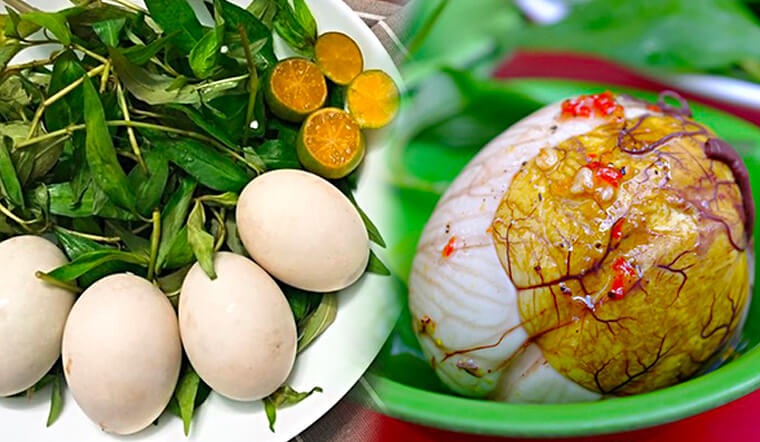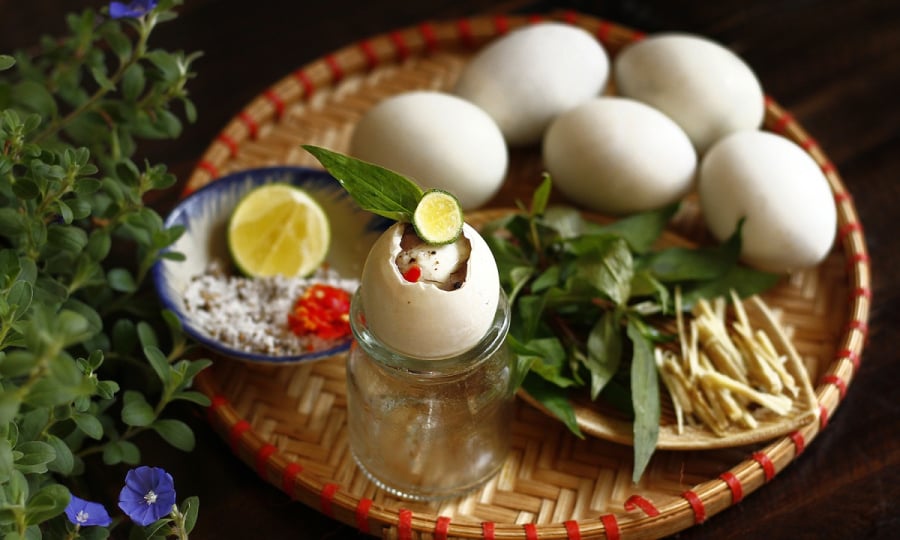How much is enough to eat balut?
For a long time, balut has been considered a delicious and nutritious food in our country and some Asian countries. To create this effect, it must be accompanied by fresh basil and sliced fresh ginger, eaten with freshly boiled balut, dipped in a slightly roasted salt for a perfect taste.

However, eating too much balut can accidentally turn “benefit” into “harm”.
According to an article on the Nguyen Tri Phuong Hospital website, one balut egg contains 182kcal of energy, 13.6g of protein, 12.4g of lipids, 82mg of calcium, 212mg of phosphorus, and 600mg of cholesterol. In addition, balut eggs also contain a lot of vitamin A, some iron, carbohydrates, vitamin B1, and C. However, it is necessary to use it correctly and in the right amount to achieve the desired effect.
Eating too many balut eggs every day and continuously can increase the levels of bad cholesterol in the blood, contributing to cardiovascular diseases, hypertension, diabetes, and increased protein levels, which is not good for people with gout.
On the other hand, eating too much raw basil can generate heat, reduce male sexual ability. Many studies have shown that basil contains some essential oils and some substances that inhibit sexual desire. Women during menstruation who eat a lot of raw basil are prone to bleeding.
Here are some things to keep in mind when eating balut:
– It is best to eat balut in the morning to provide energy for the whole day of work, avoiding eating at night, late at night, causing indigestion and weight gain.
– Do not eat it continuously for several days.
– Do not eat more than 2 balut eggs at a time, in general, most people should not eat more than 2 eggs per week.
– Balut eggs must be washed and boiled before use.
– Do not use boiled balut eggs overnight, as it will generate harmful bacteria that can affect your health.
With the information above, you probably have the answer to the question “How much is enough to eat balut?” right? Eat balut properly for your health.
When is the best time to eat balut?
Traditionally, people eat balut at night, but according to nutrition experts, the best time to eat balut is in the morning.
Because eating balut at night can lead to indigestion, bloating, and is not good for digestion, so the best time to eat balut is in the morning.

Who should not eat balut?
People who are suffering from high blood pressure, diabetes, liver inflammation, fatty liver, cardiovascular diseases, gout… should avoid eating balut as it can increase the risk of heart attacks and strokes.
Should children eat balut?
Children under 5 years old should not eat balut because their digestive system is not fully developed, which can cause bloating, digestive disorders,….
For children aged 5 and older, if they want to eat balut, they should only eat half an egg 1 to 2 times a week (half a balut egg is equivalent to 4-5 quail eggs).
Should pregnant women eat balut?
Although there is no research confirming the harmful effects of balut on pregnant women, balut is a nutritious food, so it is good for pregnant women.
Since balut contains a lot of nutrients, it should not be eaten every day. For pregnant women, it is recommended to eat 2 eggs per week, but not 2 eggs at the same time. Pregnant women should remember either to eat balut or eat very little basil, or not eat it at all because basil is harmful to the fetus.
































